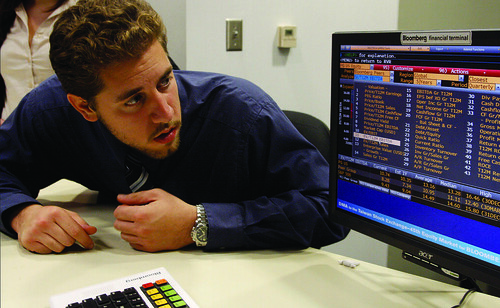Real money. Real transactions. Real accountability.
These are experiences students with an interest in high demand finance jobs will receive from the William C. Dunkelberg Owl Fund, a student-run investment organization supported by the Temple University Investment Association.
“It’s essentially a hands-on approach to investment education,” said Ryan Alberts, president of the Owl Fund and a senior finance and international business major. “It really gives students an edge and a different approach to education.”
The Owl Fund remains a work in progress. Currently, the group does not use real money. Instead, it is hypothetically investing in the stock market with virtual money to gain an understanding about the process of investing and related risks.
“I don’t think any real money will be invested until January 2010,” said Dr. Jonathan Scott, the group’s faculty adviser. “We do need to get approval from the Board of Trustees, and we’re looking at February to get that approval.”

The Owl Fund will present the Board of Trustees with the process of how students are going to select stocks to purchase. There are regulations in place to make sure the Owl Fund does not become a student stock-trading operation.
“There are controls in place to make sure you can’t just go out and buy 10,000 shares of something.” Scott said.
All purchases are to be made by the university’s treasurer using money the group has raised from donations.
“The university has its own endowment, and we won’t touch that,” Alberts said. “Everything that we will manage will be raised ourselves but will be a separate part of the university’s endowment.”
The organization uses the assets it has raised to give students hands-on experience with the premier tools in the finance industry. A perk to being in the organization is the free use of a Bloomberg Terminal in the TECH Center. The Bloomberg Terminal is a computer system that allows students access to the Bloomberg data service, which provides real-time financial data.
The system is one of the most sought after research tools in the investment industry. It is expensive, with costs estimated at nearly $1,800 for monthly use. The company, Bloomberg L.P., does not offer any discount to universities.
“Any big financial institution uses Bloomberg,” Alberts said. “It covers bonds, stocks and everything in between in real time.”
Exposure to Bloomberg Terminal and other financial tools gives students experience to obtain better internships and jobs in the finance profession.
“My vision is to break Temple into consulting, banking and all these high finance jobs and that’s to create these networks,” Alberts said. “This is the stuff Wharton and Penn State have.”
The Owl Fund’s organizational model is similar to a group at Penn State University. The group was created eight years ago and started using real money in 2004.
It is currently working with about $5.2 million and has created an alumni network on Wall Street to make the university’s Smeal College of Business highly sought after.
Alberts, 11 student fund managers and their respective analysts are investing in various industries of the S&P500. They chose companies to invest in based on internal and external aspects of companies as well as their positions in the market.
“We try to find companies that we term as undervalued stocks,” Alberts said. “At the Owl Fund, we look for value stocks, which we think are companies that are going to give solid returns.”
The group keeps its portfolio diverse in order to avoid pitfalls from the recent economic downturn.
“We’re not looking at financials right now because they’re the cause of the destruction in the markets,” Alberts said. “If we were entirely invested in financials right now, we would be slaughtered.”
Despite the current state of the economy, the process of investing and money management remains a constant.
“There’s going to be a growing need for individuals in the money management business.” Scott said.
Alberts, Scott and M. Moshe Porat, dean of the Fox School of Business, started the Owl Fund two years ago. The group has about 25 members because the Owl Fund did not do a lot of advertising. Word of the Owl Fund has been spread through TUIA, and its membership is expected to increase next semester.
“We kind of launched this semester, and we will officially launch when Alter Hall opens,” Alberts said. “We’re expecting about 100 analysts next semester.”
The group has received donations from PNC Bank and Temple alumni. Its fundraising goal is to reach $250,000, and Scott said the group is well on its way to achieving that goal.
He said the ultimate goal is to give students the skills and networks needed to get careers and internships.
“People believe in this,” Alberts said. “Even in these times, people are pulling their money and investing in students and their future.”
Brian Dzenis can be reached at brian.dzenis@temple.edu.


Be the first to comment